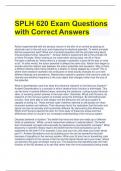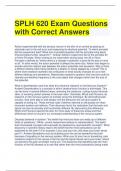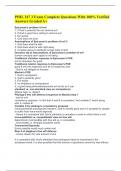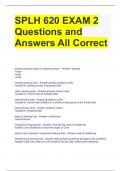Decartes - Guides d'étude, Notes de cours & Résumés
Vous recherchez les meilleurs guides d'étude, notes d'étude et résumés sur Decartes ? Sur cette page, vous trouverez 56 documents pour vous aider à réviser pour Decartes.
Page 2 sur 56 résultats
Trier par

-
PHIL 347 3 Exam Questions With 100% Verified Answers
- Examen • 3 pages • 2024
-
Disponible en pack
-
- €10,08
- + en savoir plus
PHIL 347 3 Exam Questions With 100% Verified Answers Epicurean's problem of evil 1. If God is powerful he can remove evil 2. If God is good he is willing to remove evil 3. Evil exists 4. God does not exist Assumptions of Epicurean's problem of evil 3 1. God does what he wills 2. God does what he wills right away 3. It makes sense to attribute human traits to God Decartes obj to Assumptions of Epicurean's problem of evil human concepts don't apply to inf being Traditional christi...

-
Apologetics EXAM ALL QUESTIONS AND CORRECT DETAILED ANSWERS WITH RATIONALES (VERIFIED ANSWERS)
- Examen • 16 pages • 2024
-
Disponible en pack
-
- €12,00
- + en savoir plus
Apologetics EXAM ALL QUESTIONS AND CORRECT DETAILED ANSWERS WITH RATIONALES (VERIFIED ANSWERS) Apologetics - Answer- the reasoned defense of the Christian faith Worldview - Answer- outlook or perspective on the world that is in all of reality and all of our experience of it. Concerns how you think and interact with the world on a basic level Apologetics as proof - Answer- Reasons to believe the Christian worldview is true or reasonable. Positive function: asks why should I believe in Chri...

-
PHIL 347 3 Exam Complete Questions With 100% Verified Answers Graded A+
- Examen • 3 pages • 2024
-
- €9,98
- + en savoir plus
PHIL 347 3 Exam Complete Questions With 100% Verified Answers Graded A+ Epicurean's problem of evil 1. If God is powerful he can remove evil 2. If God is good he is willing to remove evil 3. Evil exists 4. God does not exist Assumptions of Epicurean's problem of evil 3 1. God does what he wills 2. God does what he wills right away 3. It makes sense to attribute human traits to God Decartes obj to Assumptions of Epicurean's problem of evil human concepts don't apply to inf ...

-
PHIL 347 3 Exam Questions With 100% Verified Answers
- Examen • 3 pages • 2024
-
Disponible en pack
-
- €10,08
- + en savoir plus
PHIL 347 3 Exam Questions With 100% Verified Answers Epicurean's problem of evil 1. If God is powerful he can remove evil 2. If God is good he is willing to remove evil 3. Evil exists 4. God does not exist Assumptions of Epicurean's problem of evil 3 1. God does what he wills 2. God does what he wills right away 3. It makes sense to attribute human traits to God Decartes obj to Assumptions of Epicurean's problem of evil human concepts don't apply to inf being Traditional christi...

-
SPLH 620 Exam Questions with Correct Answers
- Examen • 7 pages • 2023
-
Disponible en pack
-
- €11,04
- + en savoir plus
SPLH 620 Exam Questions with Correct Answers Adrian experimented with the sensory neuron in the skin of an animal by placing an electrode next to the cell axon and measuring its electrical potential. To which principle did this experiment lead? What sort of problem/question did this principle bring about (that prompted further research)? - Answer-Adrian's experiment led to the principle All or None Principle. When looking at my notes taken during class, the All or None Principle is defined as...

-
PHIL 347 3 Exam Complete Questions With 100% Verified Answers Graded A+
- Examen • 3 pages • 2024
-
- €9,98
- + en savoir plus
PHIL 347 3 Exam Complete Questions With 100% Verified Answers Graded A+ Epicurean's problem of evil 1. If God is powerful he can remove evil 2. If God is good he is willing to remove evil 3. Evil exists 4. God does not exist Assumptions of Epicurean's problem of evil 3 1. God does what he wills 2. God does what he wills right away 3. It makes sense to attribute human traits to God Decartes obj to Assumptions of Epicurean's problem of evil human concepts don't apply to inf ...

-
SPLH 620 Exam Questions with Correct Answers
- Examen • 7 pages • 2024
-
- €12,48
- + en savoir plus
SPLH 620 Exam Questions with Correct Answers Adrian experimented with the sensory neuron in the skin of an animal by placing an electrode next to the cell axon and measuring its electrical potential. To which principle did this experiment lead? What sort of problem/question did this principle bring about (that prompted further research)? - Answer-Adrian's experiment led to the principle All or None Principle. When looking at my notes taken during class, the All or None Principle is defined as ...

-
PHIL 347 3 Exam Complete Questions With 100% Verified Answers Graded A+
- Examen • 3 pages • 2024
-
- €9,12
- + en savoir plus
PHIL 347 3 Exam Complete Questions With 100% Verified Answers Graded A+ Epicurean's problem of evil 1. If God is powerful he can remove evil 2. If God is good he is willing to remove evil 3. Evil exists 4. God does not exist Assumptions of Epicurean's problem of evil 3 1. God does what he wills 2. God does what he wills right away 3. It makes sense to attribute human traits to God Decartes obj to Assumptions of Epicurean's problem of evil human concepts don't apply to inf being ...

-
SPLH 620 Exam Questions with Correct Answers
- Examen • 15 pages • 2024
-
Disponible en pack
-
- €8,16
- + en savoir plus
SPLH 620 Exam Questions with Correct Answers Adrian experimented with the sensory neuron in the skin of an animal by placing an electrode next to the cell axon and measuring its electrical potential. To which principle did this experiment lead? What sort of problem/question did this principle bring about (that prompted further research)? - Answer-Adrian's experiment led to the principle All or None Principle. When looking at my notes taken during class, the All or None Principle is d...

-
Apologetics EXAM ALL QUESTIONS AND CORRECT DETAILED ANSWERS WITH RATIONALES (VERIFIED ANSWERS)
- Examen • 11 pages • 2024
-
Disponible en pack
-
- €14,40
- + en savoir plus
Apologetics EXAM ALL QUESTIONS AND CORRECT DETAILED ANSWERS WITH RATIONALES (VERIFIED ANSWERS) Apologetics - ANSWER- the reasoned defense of the Christian faith Worldview - ANSWER- outlook or perspective on the world that is in all of reality and all of our experience of it. Concerns how you think and interact with the world on a basic level Apologetics as proof - ANSWER- Reasons to believe the Christian worldview is true or reasonable. Positive function: asks why should I believe in Ch...

Ce résumé que vous venez d'acheter a fait très plaisir à quelqu'un. Vous voulez aussi être payé chaque semaine ? Vendez vos documents d'étude sur Stuvia ! Découvrez tout sur gagner de l'argent sur Stuvia


